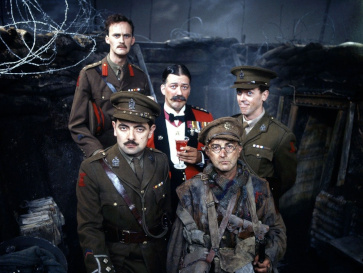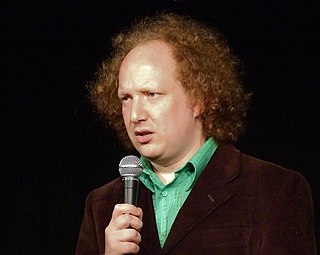Related Research Articles

Blackadder is a series of four period British sitcoms, plus several one-off instalments, which originally aired on BBC One from 1983 to 1989. All television episodes starred Rowan Atkinson as the antihero Edmund Blackadder and Tony Robinson as Blackadder's dogsbody, Baldrick. Each series was set in a different historical period, with the two protagonists accompanied by different characters, though several reappear in one series or another, e.g., Melchett, Lord Flashheart and George.

Made in Canada is a Canadian television comedy which aired on CBC Television from 1998 to 2003. Rick Mercer starred as Richard Strong, an ambitious and amoral television producer working for a company which makes bad television shows. A dark satire about the Canadian television industry, the programme shifted into an episodic situation comedy format after its first season.

British humour carries a strong element of satire aimed at the absurdity of everyday life. Common themes include sarcasm, tongue-in-cheek, banter, insults, self-deprecation, taboo subjects, puns, innuendo, wit, and the British class system. These are often accompanied by a deadpan delivery which is present throughout the British sense of humour. It may be used to bury emotions in a way that seems unkind in the eyes of other cultures. Jokes are told about everything and almost no subject is off-limits, though a lack of subtlety when discussing controversial issues is sometimes considered insensitive. Many British comedy series have become successful internationally, serving as a representation of British culture to overseas audiences.
King of Kensington is a Canadian television sitcom which aired on CBC Television from 1975 to 1980.
Humour is an integral part of the Canadian identity. There are several traditions in Canadian humour in both English and French. While these traditions are distinct and at times very different, there are common themes that relate to Canadians' shared history and geopolitical situation in North America and the world. Though neither universally kind nor moderate, humorous Canadian literature has often been branded by author Dick Bourgeois-Doyle as "gentle satire," evoking the notion embedded in humorist Stephen Leacock's definition of humour as "the kindly contemplation of the incongruities of life and the artistic expression thereof."
Nothing Too Good for a Cowboy is a Canadian television drama series, which aired on CBC from 1998 to 2000. The series, which is set in the 1940s, was based on the memoirs of author and rancher Richmond P. Hobson, Jr. and set on a ranch in rural northern British Columbia.
Dear Aunt Agnes is a Canadian television comedy-drama series that aired on TV Ontario from January 1986 to December 1989. It was filmed in Toronto, Ontario, and ran for three seasons.
SexTV was an award-winning, internationally-syndicated Canadian documentary television series that explored all facets of human sexuality and gender in a thought-provoking and cutting-edge way. Founded by the Canadian media executive Moses Znaimer, the show premiered on national broadcast television in 1999 on Citytv and ran for ten seasons (1999-2008). Citytv was a trailblazing, local TV station in Toronto with independent origins and ground-breaking content. The station was home to other well-known shows at the time including Much, FashionTelevision, the Space Channel and Bravo's 'Arts and Minds'. CityTV was the first independent television station in Toronto and the producers of these shows worked in the iconic and heritage building 299 Queen Street West in the city's downtown core.

The Canadian Comedy Awards (CCA) is an annual ceremony that awards the Beaver for achievements in Canadian comedy in live performance, radio, film, television, and Internet media. The awards were founded and produced by Tim Progosh in 2000.
Mosquito Lake was a short-lived Canadian television sitcom, which aired on CBC Television in the 1989–90 television season. The show, a family sitcom, starred comedian Mike MacDonald as Bob Harrison, the father of a family spending the summer in a dilapidated cottage on Mosquito Lake.
The Associates is a Canadian television drama series that aired on CTV in 2001 and 2002. The show centred on the professional and personal lives of five junior associate lawyers at the Toronto office of the multinational law firm of Young, Barnsworth & King.

Less Than Kind is a 2008–2013 Canadian television comedy-drama series that stars Jesse Camacho as Sheldon Blecher, a teenager growing up in a loving but dysfunctional Jewish family in Winnipeg. The show's cast also includes Maury Chaykin and Wendel Meldrum as Sheldon's parents, Benjamin Arthur as his older brother Josh, and Nancy Sorel as his aunt Clara. The Blechers struggle to operate a driving school out of their home in Winnipeg's fading North End. Less Than Kind made its debut October 13, 2008, on Citytv, and moved to HBO Canada in February 2010.
The Academy of Canadian Cinema and Television presents an annual award for Best Dramatic Series. Formerly presented as part of the Gemini Awards program, since 2013 the award has been presented as part of the expanded Canadian Screen Awards.
The Academy of Canadian Cinema and Television presents an annual award for Best Comedy Series.
The Canadian Screen Award for Best Actor in a Continuing Leading Dramatic Role is an annual Canadian television award, presented by the Academy of Canadian Cinema and Television to the best leading performance by an actor in a Canadian television series. Previously presented as part of the Gemini Awards, since 2013 it has been presented as part of the Canadian Screen Awards.
The Canadian Screen Award for Best Actress in a Continuing Leading Dramatic Role is an annual Canadian television award, presented by the Academy of Canadian Cinema & Television to the best leading performance by an actress in a Canadian television series. Previously presented as part of the Gemini Awards, since 2013 it has been presented as part of the Canadian Screen Awards.
Dog House is a Canadian comedy television series broadcast by YTV in the 1990–91 season.
The 1st Canadian Comedy Awards honoured the best Canadian comedy of 1999 in live performances, television and film. The awards ceremony was presented by the Canadian Comedy Foundation for Excellence (CCFE), and was held on 6 April 2000 at the Masonic Temple in Toronto, Ontario. The ceremony was hosted by Dave Thomas. A one-hour version of the ceremony was broadcast late the following night on CTV, and the full program aired on The Comedy Network on 9 April at 9 pm.
The Endless Grind is a Canadian comedy anthology television series, which aired on The Comedy Network in 2001. Created by Greg Lawrence, a producer also known for Kevin Spencer and Butch Patterson: Private Dick, the series was conceived as a set of "short stories" about various characters linked by their shared patronage of a neighbourhood coffee shop; a black comedy which Lawrence described as "a weird hybrid of sketch, sitcom and short film", each segment centred on an incident in the lives of a patron of the coffee shop, such as a couple debating whether to abort the puppies when they discover that their dog is pregnant.
The Gemini Award for Best Ensemble Performance in a Comedy Program or Series is a defunct award category, presented by the Academy of Canadian Cinema and Television from 2001 to 2011 as part of its Gemini Awards program to honour ensemble performance in comedy programs. Winners and nominees were typically either sketch comedy shows, or the collective cast of a scripted narrative comedy series.
References
- ↑ John McKay, "Blackfly is a mix of Blackadder, F Troop and Blazing Saddles". Niagara Falls Review , December 28, 2000.
- 1 2 John Doyle, "A People's History from a hoser's perspective". The Globe and Mail , January 4, 2001.
- ↑ "The file on Blackfly, Global TV's new sitcom debuting next week". Canadian Press, December 27, 2000.
- ↑ "Shooting complete on comedy pilot". Nanaimo Daily News , July 21, 1999.
- 1 2 Tony Atherton, "Blackfly deserves to be a series". Ottawa Citizen , August 28, 1999.
- ↑ "Global TV: size and youth matter for fall season". Canadian Press, June 5, 2000.
- ↑ Michael Posner, "Blackfly set to buzz". The Globe and Mail , January 1, 2001.
- ↑ "TV series Blackfly gives standup comedian Ron James higher profile". Canadian Press, February 8, 2001.
- 1 2 Joel Rubinoff, "Canadian sitcom Blackfly may be an acquired taste". Waterloo Region Record , December 1, 2001.
- ↑ "Global goes for Murder, kills Blackfly; The big new arrival on CBC will be Escaping, about a young single woman of Italian descent working in Montreal". Guelph Mercury , May 2, 2002.
- ↑ Tony Atherton, "This Blackfly has no comic bite: Colonial-days comedy throwback to dawn of TV". Ottawa Citizen , January 4, 2001.